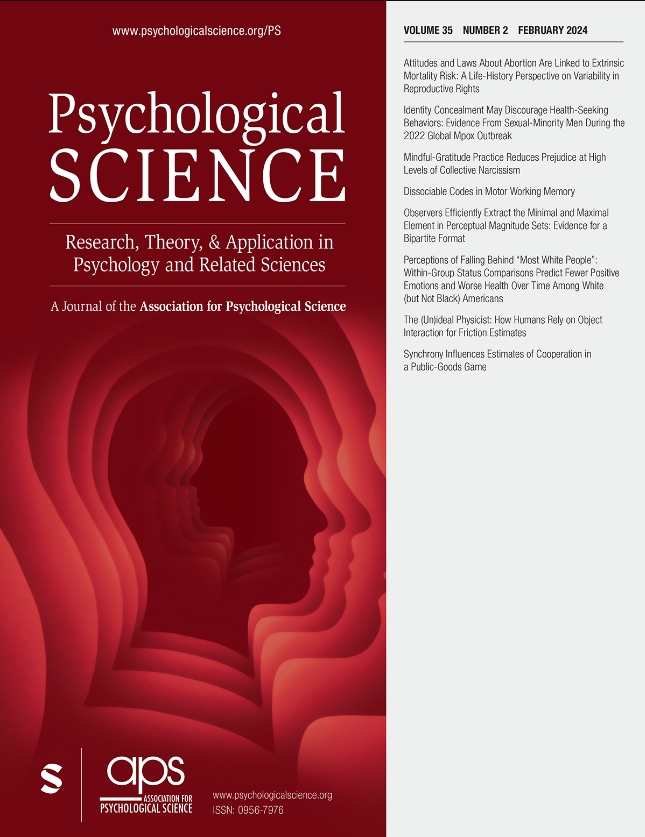个人学业优势中的性别平等悖论:跨时空分析
IF 5.1
1区 心理学
Q1 PSYCHOLOGY, MULTIDISCIPLINARY
引用次数: 0
摘要
与总体成绩无关,女生的个人学习优势通常是阅读,而男生的优势通常是数学或科学。个体内部优势的性别差异与科学、技术、工程和数学(STEM)领域的教育和职业性别差异有关。矛盾的是,在性别更平等的国家,这些性别差异更大,但这一矛盾的稳定性还存在争议。我们通过分析国际学生评估项目(PISA)五波(2006-2018 年)中 85 个国家和地区近 250 万青少年的学业成绩,评估了个体内部优势性别平等悖论的稳定性及其与财富的关系。在不同国家和波次中,女孩在阅读方面的个体内部优势以及男孩在数学和科学方面的优势是稳定的。在性别更平等的国家,男生在科学方面的个人优势更大,而在更富裕的国家,女生在阅读方面的优势更大。这些结果对缩小 STEM 领域的性别差异具有重要意义。本文章由计算机程序翻译,如有差异,请以英文原文为准。
The Gender-Equality Paradox in Intraindividual Academic Strengths: A Cross-Temporal Analysis
Independent of overall achievement, girls’ intraindividual academic strength is typically reading, whereas boys’ strength is typically mathematics or science. Sex differences in intraindividual strengths are associated with educational and occupational sex disparities in science, technology, engineering, and mathematics (STEM) fields. Paradoxically, these sex differences are larger in more gender-equal countries, but the stability of this paradox is debated. We assessed the stability of the gender-equality paradox in intraindividual strengths, and its relation to wealth, by analyzing the academic achievement of nearly 2.5 million adolescents across 85 countries and regions in five waves (from 2006 to 2018) of the Programme for International Student Assessment (PISA). Girls’ intraindividual strength in reading and boys’ strength in mathematics and science were stable across countries and waves. Boys’ advantage in science as an intraindividual strength was larger in more gender-equal countries, whereas girls’ advantage in reading was larger in wealthier countries. The results have implications for reducing sex disparities in STEM fields.
求助全文
通过发布文献求助,成功后即可免费获取论文全文。
去求助
来源期刊

Psychological Science
PSYCHOLOGY, MULTIDISCIPLINARY-
CiteScore
13.30
自引率
0.00%
发文量
156
期刊介绍:
Psychological Science, the flagship journal of The Association for Psychological Science (previously the American Psychological Society), is a leading publication in the field with a citation ranking/impact factor among the top ten worldwide. It publishes authoritative articles covering various domains of psychological science, including brain and behavior, clinical science, cognition, learning and memory, social psychology, and developmental psychology. In addition to full-length articles, the journal features summaries of new research developments and discussions on psychological issues in government and public affairs. "Psychological Science" is published twelve times annually.
 求助内容:
求助内容: 应助结果提醒方式:
应助结果提醒方式:


